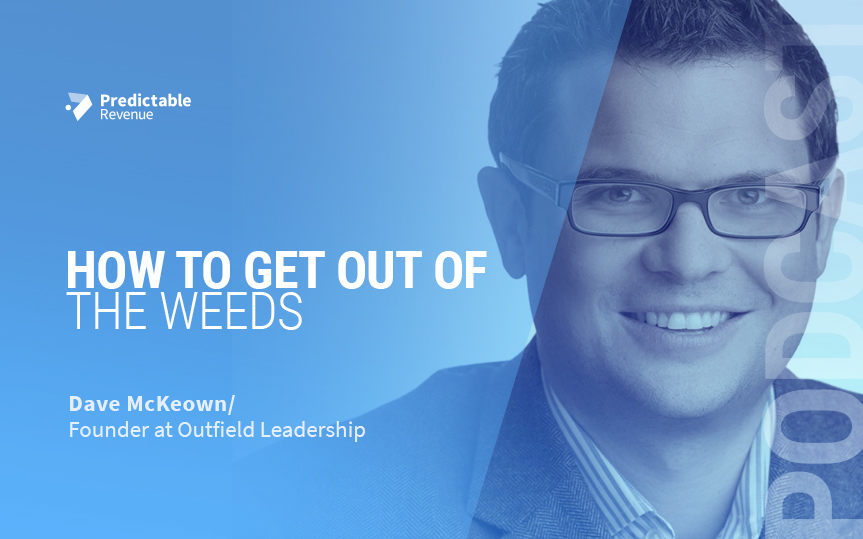How To Get Out Of The Weeds

Many leaders think they bring value to their teams by being in the trenches with them – but if you find yourself getting caught up in the day-to-day, you’re missing out on where you bring the most value to your team. Dave McKeown, a recent guest on the Predictable Revenue Podcast. We asked him how leaders can elevate their focus, develop their people, and accomplish more.
OUT WITH THE OLD
If you look back over the history of some of the traditional management models and approaches, Dave explains, you’re left with the sense that, to be an effective leader, a manager needs to act with a huge degree of certainty. They need to know exactly where the company is going, at all times. They lead the charge, and their people follow behind. When these models were created, this management style was valid. But, the world today is too complex and moves too quickly for any leader to say, with complete certainty, that they know where their organization is going. There are too many variables at play, and our teams know it. Leading with utter certainty now comes off as inauthentic and disingenuous. Instead, teams are looking for managers who will lead with vulnerability; who admit they may not know everything but that together, the organization can figure it out and do some truly great things.
IN WITH THE NEW IN 3 STEPS
This 3-step strategy is grounded in the context of high-growth, founder-led organizations (Dave’s specialty). The tendency of fast-growing organizations, Dave explains, is to say yes to everything and to figure out how to deliver on it later. This translates to a leader who is constantly jumping in to save the day for their teams and clients. At first, this strategy lends itself well to smaller organizations because it affords companies the flexibility and agility they need to grow. It is almost the only way an early-stage company can grow.
At some point, however, this strategy becomes a liability. Companies hit a certain threshold, whether that’s employee headcount, locations, or some other metric, and the “say yes now, figure out how to deliver later” plan starts to split at the seams. Leaders can’t “hero” their way out of everything – the world around them has become too complex.
The solution, then, is for leaders to shift their strategy to one that is more self-evolved. One where they are no longer the epicenter of their company. “If you want to build a truly scalable business that will outlive you and outlast you, you need to remove yourself from the center of the story and start building a team around you.”
Step 1: Assess the vision you have for your organization and your team.
Often, in entrepreneurial companies, the Founder and the vision are inextricably linked. The vision is personified in the leader. This is fundamentally unscalable. Instead, leaders must collaborate with their teams to create a vision that can be achieved together.
Step 2: Build an implementation drumbeat to help you achieve that vision.
Start to break down your vision. If we want to achieve x in 10 years, what do we need to achieve this year? In the next 5 years? This quarter? This month? This week? Today?
The actions everyone in the organization takes on any given day add up over time and determine whether or not you will achieve your strategic vision, so your people need direction on what to do each day to keep the organization on course. Most leaders are great at looking at the very high level and what tasks need to be completed today, but aren’t very useful at breaking down in the middle. As a leader, it is your job to connect the dots.
Step 3: Create a series of leadership disciplines to help you navigate that journey.
We’ll dive more into this below.
MODERN LEADERSHIP MINDSET
To kick their crisis management habits, leaders first need to realize that problems and crises have a gravitational pull. It is often more exciting to spend time putting out fires than thinking about your organization’s medium and long-term direction. It also gives us a bit of an ego boost when we solve a problem for someone else – it lets us finish work for the day feeling wanted, needed, valued, and useful. The risk with this habit is that you end up creating a culture of learned helplessness on your team which results in a bottleneck: you.
You need to refocus your attention on what it means to be a great leader. Once upon a time, a manager’s job was to help a team hit their goals, and this alone. Now, a manager’s job is to help their team hit their goals and to grow and develop their people. If that’s your model, there’s no room for you as the hero.
CYCLE OF MEDIOCRITY
This model sums up Dave’s theories. It’s a cycle where everyone involved is prevented from delivering their best work. In this world where everything and nothing is urgent, our leaders, based on their ego and the old management models, believe their job is to save the day. They lead through acts of heroism which mount in the culture of learned helplessness. Under heroic leadership, people become frustrated and disempowered. Leaders become despondent about their seemingly incompetent people. It’s a 2-sided trap that ultimately leads to failure.
PRIORITIZATION
Modern leaders need to get good at prioritizing what needs their attention. We, as human beings, tend to allow anyone to interrupt us and assign any priority they want. Suddenly, everything is urgent and strategic planning goes out the window.
But if everything is urgent, then nothing is urgent. Instead, use something like the Eisenhower Matrix to determine what is truly urgent and needs immediate attention. Once you’ve identified a real crisis, make sure your first response isn’t to fix it yourself. Ask yourself who on your team might do a good job fixing it instead. You can still support the project, but stepping back makes sure that you don’t get pulled into the weeds and that your people have opportunities to learn and grow.
Where you add value as a leader is on the things that are important but not urgent. These are the items that stay on your to-do list for months, forever relegated to the bottom in favour of more “urgent” tasks. When you leave these items for last, one of two things happens: either these items never become urgent and never get done, or they become urgent when they have resulted in a real crisis – at which point it is too late to do them. Dave encourages you to “delegate your crises… and spend more of your time working on those important but not urgent aspects.”
THE 80/20 RULE
A leader should delegate 80% of their to-do list. A simple (but not easy way) Dave suggests you do this is by looking down your list and asking yourself, for every item, “Is there somebody on my team who, even if they needed a little advice, guidance, support, coaching, could do this thing?” If the answer is yes, delegate it.
Many leaders come up with excuses as to why they can’t delegate a task. They might think it’ll take someone else too long or that person won’t do it correctly. Dave maintains that these ideas are ego-driven, and keep you trapped in the cycle of mediocrity. They give you a false belief of what your value is to your organization. So, have an honest conversation with yourself about what kind of leader you want to be and what you want for your organization. If you don’t want to get out of the weeds, you’ll never be able to hand anything off to someone else, and your organization won’t scale.
The remaining 20% of your list should be things that only you can do. And don’t worry if your calendar isn’t full – now you get to decide what to do with your time instead of having circumstances dictate it for you.
MENTORING & COACHING
“Mentoring and coaching are two really important tools that a leader has to grow and develop their people” – so use your extra time to do that.
This involves coaching your people through challenges instead of telling them what to do. Ask questions about the issue, and ask questions about how a person might go about solving it, then support them in implementing their solution.
Mentor people who are outside of your direct chain of command. Give them access to how you think, how you approach things, and how you’d overcome challenges so they can learn from your experience.
GET OUT OF COVID-CRISIS MODE
Over the last couple of years, there have been a lot of truly urgent crises that leaders have had to fight. This has locked a lot of organizations into a crisis-management mode that they are struggling to get out of. It is vital that over the next 12-18 months, leaders pull themselves out of this mindset and assess where they’ve emerged, how their organizations are different, and what they want the strategic vision to be so that they can get back out of the weeds.
BUSINESS IMPACT
There are 2 overarching benefits for organizations and leaders who make this shift.
- They have a better chance of truly scaling because their success and vision are not personified.
- They will build and foster a culture where people thrive because of their opportunities to grow, develop, and become leaders themselves.
CONCLUSION:
Traditional management models asked leaders to be the hero, the steadfast general leading them to success. But the modern, complex, remote, dispersed world of business is much more complex than this model allows for. Leaders today need to stop saving the day for their teams and organizations and instead shift their focus to the medium and long-term; they need to make time to grow and develop their people, and they need to decenter themselves from the story of their company if they have any chance of scaling it.
EDITOR’S NOTE:
More on scaling a business while retaining the essence of the founder: How to Scale Your Business So It Sells Like a Fortune 500, With The Culture And Agility of a Startup
And on setting goals with your people, instead of for them, so they are bought-in: Why SDRs should set their own targets with Mark Garrett Hayes
NO TIME TO READ?
Listen On:
Experience and a lot of testing have shown us that it is possible to create email templates that people actually resonate with.
You don’t have to figure it out alone, whether you’re starting off as a sales representative, looking to improve your game or providing your team with expert advice, we have your back!


